
V. S. Srinivasa Sastri
A commemorative postage stamp on Valangaiman Sankaranarayana Srinivasa Shastri, an Indian politician, administrator, educator and orator, India‘s Agent to the Union of South Africa (1927-29), a founding member of Indian Liberal Party :

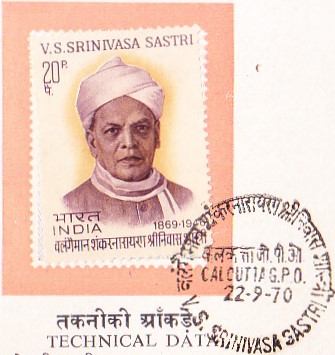
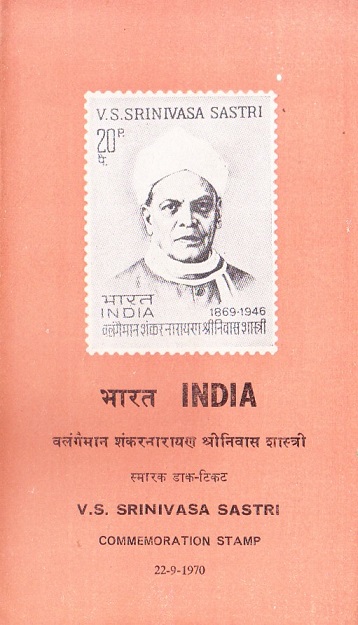 Issued by India
Issued by India
Issued on Sep 22, 1970
Issued for : The Posts and Telegraphs Department joins with the millions in this country in paying its homage to this illustrious son of India by issuing a special commemorative stamp in his honour.
Description of Design : The design of the stamp is vertical and depicts a portrait of V.S. Srinivasa Sastri.
Type : Stamp, Mint condition
Colour : Chestnut and Plum
Denomination : 20 Paise
Overall Size : 3.91 x 2.90 cms.
Printing Size : 3.56 x 2.54 cms.
Perforation : 13 x 13
Paper : Printed on unwatermarked adhesive stamp paper
Number Printed : 30,00,000
Number per issue sheet : 35
Printing Process : Photogravure
Designed and Printed at : India Security Press
Name : Valangaiman Sankaranarayana Srinivasa Sastri
Born on Sep 22, 1869 at Valangaiman, Valangaiman taluk, Thiruvarur district, Tamil Nadu, India
Died on Apr 17, 1946 at Mylapore, Tamil Nadu, India
About :
- Shri Valangaiman Sankaranarayana Srinivasa Sastri was born on 22nd September, 1869 of a humble family in the village of Valangaiman in the Thanjavur District of Tamilnadu. Sastri had a brilliant educational career, financing his education by winning scholarships and stipends for his uniformly high academic performance. Soon after graduation, he joined the Mayavaram Municipal High School as an assistant. Shortly thereafter, Sastri had established a position for himself as an educationist in Madras, where he was the Headmaster of the Hindu High School, before joining the Servants of India Society in 1907. His knowledge of public affairs and his ability to express himself clearly, elegantly and forcibly, evoked admiration. The reputation acquired by him as a member of the Madras Legislative Council, made the members of the Servants of India Society look upon him as the only one among them, who could be Gokhale’s successor, and elected him as the President of the Servants of India Society. It has been said that indeed he was Gokhale’s greatest disciple.
- Like his Guru Gokhale, Sastri was firmly of the opinion that constitutional methods should be our only weapon for securing the freedom of the country and that we should remain in the Commonwealth. Even though they differed in their approach regarding the means to be employed for securing independence of the country, Gandhiji held Sastri in great respect. His forcible and impressive speech on the Rowlatt Bill in 1919 won Gandhiji’s admiration. Sastri’s eloquence combined with character and personality made him an admirable representative of India in international conferences and negotiations with the Dominions. He had cultivated an admiration for the English language and literature and won the hearts of his British listeners by the facile fluency and flawless utterance of English and came to be known as the ‘Silver Tongued’ orator of the British Empire.
- Sastri went to England as a member of the Liberal Federation Deputation, and gave evidence before the Joint Parliamentary Committee on Montagu–Chelmsford Reforms. Sastri attended along with Maharao of Cutch the Imperial Conference of 1921 held in London wherein he moved the resolution suggesting that Dominion Governments of the British Commonwealth should confer full citizenship rights on all Indians lawfully domiciled in them. Despite the powerful opposition to Sastri’s proposal by General Smuts of South Africa, the resolution was accepted. Following this, he was invited to tour Australia, Canada and New Zealand. Later, he was made the Privy Councillor which further enhanced his prestige and position in the eyes of English people settled in the Dominions.
- Sastri took up the cause of Indian settlers in Kenya, a Crown colony, with great interest. In 1923, as a Member of the Council of State, he moved a resolution demanding full and equal rights of citizenship for the Indian settlers. Sastri also attended the First and Second Round Table Conferences in London and made valuable contributions.
- When the problem of Indians in South Africa became acute, even though reluctant at first, Sastri accepted the position of Agent-Generalship of the Government of India and went to South Africa in 1927. During his short tenure of 18 months, in this very difficult assignment, he achieved a near-miracle in getting the Natal Government to appoint a Commission to look into the problem of Indian education and in persuading the ‘White’ Trade Unions to admit Indians. He ensured the smooth working of the Cape–Town Agreement. It was during his stay in South Africa that he made a lasting contribution, namely, the founding of a Teachers Training College at Durban. The grateful South African Indians called the institution, ‘Sastri College’. A picture of this institution is depicted on our First Day Cover. In 1935, Sastri was appointed the Vice-Chancellor of the Annamalai University, one of the outstanding universities of the South. Sastri was a great scholar of Sanskrit. His lectures on Ramayana are enduring monuments of scholarship.
- He was always modest and never aspired for the glamour of position. He declined twice the Knighthood conferred on him, as also the Chairmanship of the Council of State. Sastri passed away on the 17th April, 1946. He was born humble, remained humble, leaving a rich heritage. He died a true and devoted servant of India leaving a shining example for others. Mahatma Gandhi, the Father of the Nation wrote at that time: “Death has removed not only from us, but from the world, one of India’s best sons. That he loved India passionately, everyone who knew him, could see….I am sure he had no thought of himself even on his death-bed. His Sanskrit learning was as great as, if not greater than, his English. I must not permit myself to say more save this that, though we differed in politics, our hearts were one, and I could never think that his patriotism was less than that of the tallest patriot……”


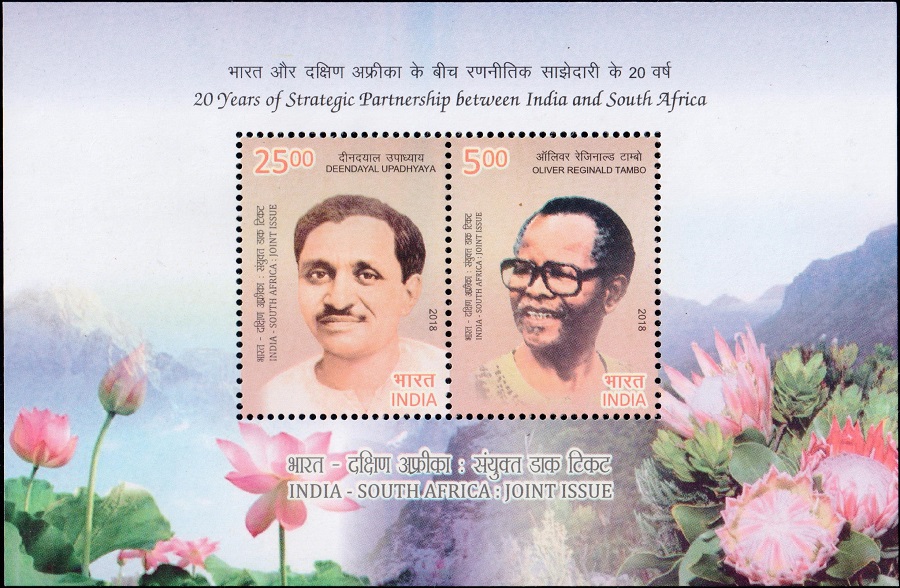
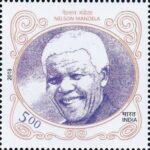
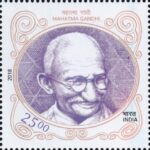
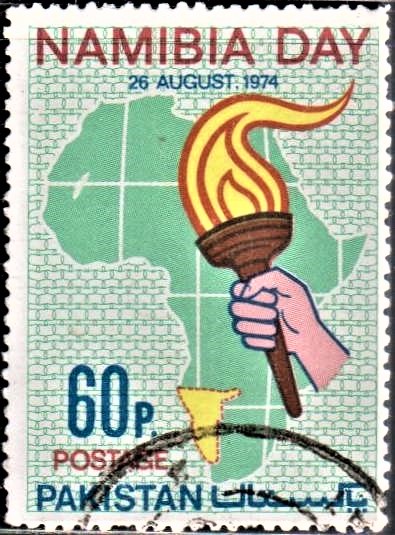

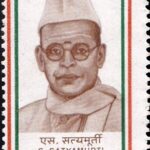
[…] in London. She proceeded, with the warm support of men like Sir Tej Bahadur Sapru and the Rt. Hon’ble V. S. Srinivasa Sastri, to have a Constitution for India as a full-fledged Dominion prepared through a National […]